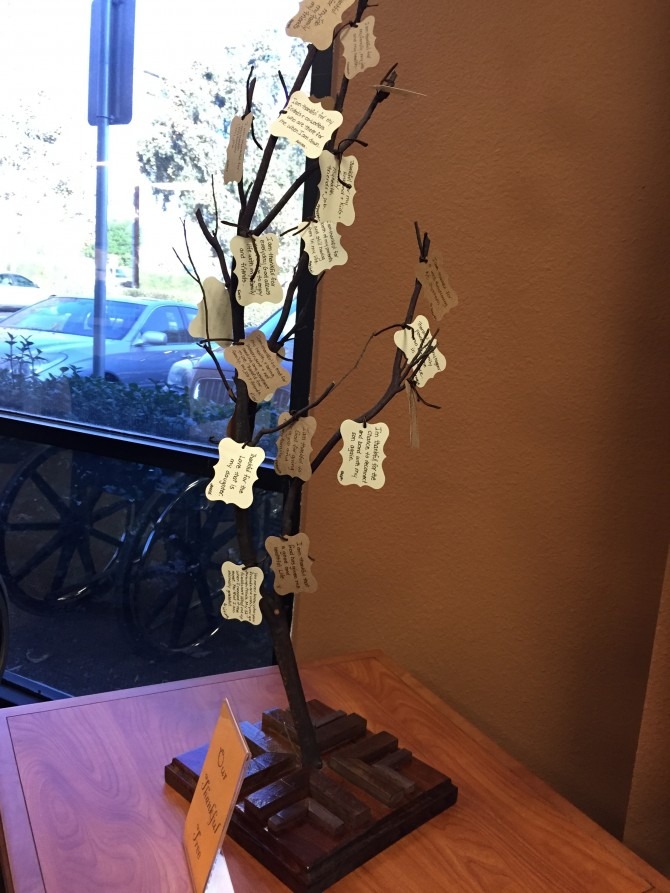Though I suppose it’s a bit unoriginal, I simply couldn’t conclude a November series on character cultivation without addressing the trait of gratitude. The practice of expressing thanks is particularly trendy this time of year. Turkey, family, football, and Black Friday sales may take center stage at Thanksgiving, but amid these other exciting traditions, most will find some way to acknowledge the eponymous virtue of this beloved American holiday. Many families practice a tradition of expressing one thing for which they are thankful before digging into the big Thanksgiving feast. Others participate in a special Thanksgiving church service or express their thanks by volunteering at a food shelter. My husband even spotted a “Thankful Tree” in the waiting room of our doctor’s office. These are all wonderful gestures, but I can’t help but wish that they were year-round activities, and not just things we do in the spirit of the Thanksgiving season.
One of the most significant values my parents instilled in me from a very early age was the importance of expressing gratitude. We never sat down to a meal without first thanking God for our food, and from the moment we could write our own names (and probably before that), my brother and I were expected to write a thank you note for every gift that we received: day-after-Christmas “Thank You Note Writing Parties” were just as much of a tradition in our household as trimming the Christmas tree or going to look at Christmas lights. Thankfulness was not optional in our household, it was a requisite state of being.
My parents not only wanted their children to exhibit an attitude of appreciation and gratitude, they also demonstrated—and continue to demonstrate—their personal gratitude on a regular basis. I don’t think I have ever seen my Dad leave the dinner table without complimenting my mom on the meal and thanking her for her work in preparing it. My mom will go out of her way to express appreciation for the smallest act of service from a friend, neighbor, or coworker. And every year, my parents forgo the traditional Christmas newsletter for an annual Thanksgiving card in which they share a specific person, moment, or experience for which they are grateful that year.
One would think that, having grown up in such a gratitude-centric household, an attitude of thanksgiving would come easily to me. In many ways it does: I am still diligent in writing personal thank you notes, and I do my best to acknowledge and express appreciation for the generosity of those around me. But even for me—someone with a powerful legacy of gratitude and an abundance of blessings for which to be thankful—an attitude of gratefulness can be difficult to cultivate. Why is it so hard? I attempted to answer this question in a blog post last Thanksgiving:
“I believe that the entitlement mentality so prevalent in our society is partly to blame. But I also wonder if our failure to give thanks is partially due to a misplacement—or total lack of placement—of our gratitude. So often, we talk about WHAT we have to be thankful for. This is a powerful exercise, and one that should be practiced regularly. But sometimes, the WHAT just isn’t enough. Life is hard. Terrible things happen. And in the midst of these trials and hardships, it can seem nearly impossible to find someTHING for which to be thankful. So we give up. We forget about being thankful, because what we have to be thankful for just isn’t enough. It is in these moments that we need to move our focus from the WHAT of thanksgiving to the WHO: who is it that is the recipient of our thanks?”
Of course, expressing thanks is not an exclusively Christian activity. A number of secular studies have shown numerous physical benefits experienced by people who express gratitude, and everyone from Oprah to Doris Day has commented on the value of being grateful. However, our gratitude holds much greater significance when it is being expressed to The One who is ultimately the source of every good and perfect gift we have received. I hope you will join me this Thanksgiving in expressing eternal gratitude to a compassionate, omnipotent, and gracious Heavenly Father. He is the reason we have to give thanks, and it is to Him that we can be unequivocally grateful.

